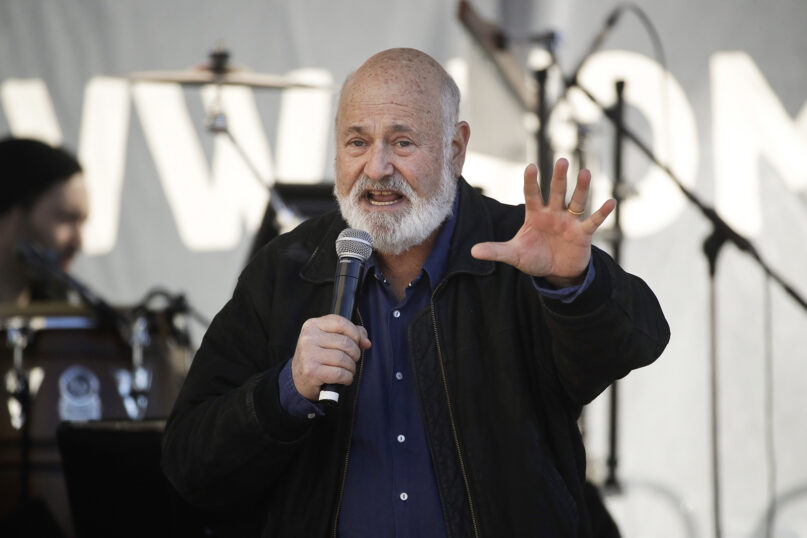(RNS) — Last week Rob Reiner released the trailer for his forthcoming movie (scheduled for release in theaters in February) on Christian nationalism. The release prompted a spirited debate on social media over the appearance of several evangelical pundits and influencers: Russell Moore, David French, Kristin Kobes Du Mez, Andrew Whitehead, Skye Jethani and Phil Vischer. All of these evangelicals appear in the film to condemn Christian nationalism. And before I go any further, Christian nationalism should be condemned.
Reiner, of course, is a brilliant filmmaker who has brought us classics such as “A Few Good Men,” “Misery,” “When Harry Met Sally” and “The Princess Bride.” He is also an atheist who has been an outspoken critic of the Christian right. No matter how nuanced or accurate his new film, “God & Country,” will be about the danger of Christian nationalism in America, viewers are going to see what they want to see in it. And let’s face it, it is very possible that much of Reiner’s audience will conflate Christian nationalism with any kind of conservative evangelical political engagement.
So, should evangelicals team up with a Hollywood producer like Reiner on a film about their fellow evangelicals? Should they be poster boys and girls for Reiner as he rolls out the Hollywood film in February with what I assume will be a massive public relations campaign? Are they selling out? Or are they truth-tellers who, as David French wrote in a post on Threads, “partner” with non-Christians “to preserve our classical liberal republic”?
Some of these evangelical commentators associated with the film have made it clear that Reiner did not become involved in this project until after they signed on to participate in the movie adaption of Katherine Stewart’s book “The Power Worshippers: Inside the Dangerous Rise of Religious Nationalism.” Others, like French, seem to believe that Reiner’s platform is less important than the imperative to speak up about the threat of Christian nationalism. Some have been smug about the criticism they are getting for joining the film, while others are deflecting the issue with humor.
As someone who speaks to the media often — sometimes as a historian and other times as an evangelical commentator — I think a lot about the role of Christians as truth-tellers. I am often accused of throwing my fellow evangelicals under the bus in order to give the secular media the kind of quote or soundbite they want to hear. The temptation to do this is real, and I know I have succumbed to it more than once.
In 2018, when I published and promoted my book “Believe Me: The Evangelical Road to Donald Trump,” I did several interviews with media outlets known for their hostility to conservative evangelicals. There was not a day that went by when I did not wonder if such outlets were using me, an evangelical Christian, to advance their political and cultural agendas. I enjoyed the attention, but could not help but think, to reference the words of one of my favorite Carole King songs, “Will they still love me tomorrow?”
I know these evangelical influencers did not know they were signing up for a Reiner film when they joined this Christian nationalism project, but that doesn’t mean it is not worth asking what they would have done if they knew it was a Reiner film from the start. What would I do?
If Reiner asked me to join this film as a commentator, I don’t know if I would participate. I say “I don’t know” because I do not want to rule out the very real possibility that my desire to tell my friends and family that I was in a Rob Reiner film might, along with personal ambition, affect my judgment. But if I did go on camera, I would probably regret it in the end. Whatever the case, I hope I’d pray long and hard about it.
Truth-telling is not as easy as it sounds. It never happens in a vacuum or outside of a larger context. Wendell Berry put it best: “Facts in isolation are false. … A fact is true in the absolute sense only in association with all facts.”
So when do we speak “truth” and when do we hold back, knowing that our truth might cause irreparable damage to another truth or, perhaps, a greater truth? When do we consider how truth-telling in a Rob Reiner film might affect our neighbors or family or the people we sit next to in the pew every Sunday — fellow believers and Christian friends who might think it is a good idea to fly a flag in the sanctuary? How do we think about truth-telling in the context of those truths that just might be inconvenient or might not fit a particular brand or platform?
In other words, when are we speaking truth to power and when are we casting our pearls before swine? These are not easy questions to answer and many evangelicals who labor in the public square will answer them in different ways. But we shouldn’t dismiss them.
In the end, I think it is best to just wait until February when we all get a chance to watch Reiner’s movie. I will be paying special attention to how his Hollywood public relations team rolls it out. But this whole dust-up also raises deeper issues about evangelical political engagement and the best way to address the real problems facing the church today. Will the people who need to hear about Christian nationalism ever watch — or heed — this film? Is this the best way of reaching our fellow believers whose minds we want to change?
How much longer do we keep preaching to the choir and call it “truth-telling”?
(John Fea teaches history at Messiah University and is the executive editor of Current. The views expressed in this commentary do not necessarily reflect those of Religion News Service.)





